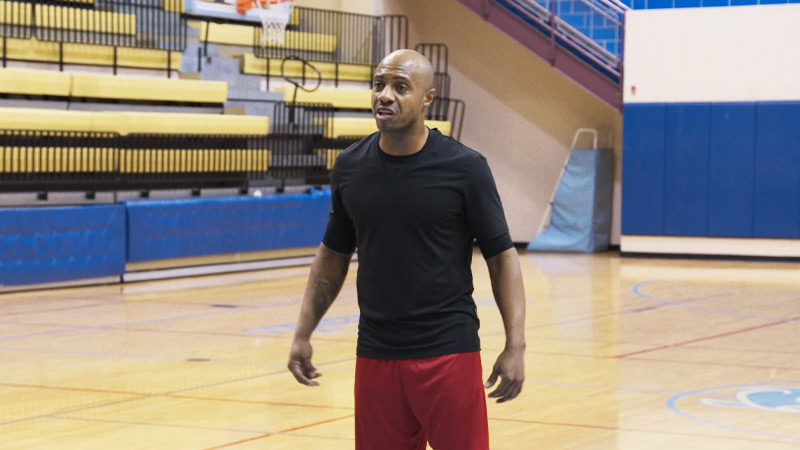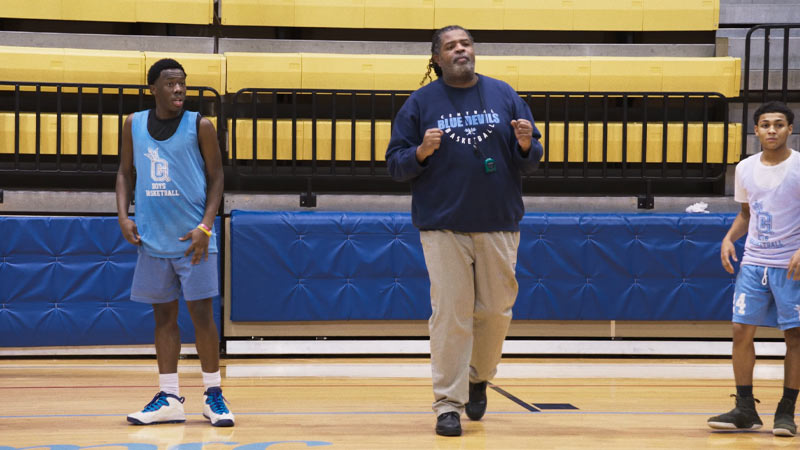Have you ever dreamed of standing on the sidelines, inspiring and guiding a basketball team to victory? Becoming a basketball coach is an exciting and rewarding journey that allows you to impart your knowledge and passion for the game to aspiring players.
Whether you’re a seasoned player looking to transition into coaching or a basketball enthusiast eager to share your love for the sport, this blog post will guide you through the steps to becoming a successful basketball coach.
From gaining basketball knowledge and experience to acquiring the necessary certifications and practical skills, let’s explore the path to becoming a coach who can make a positive impact on the court and on the lives of your players.
The Role of a Basketball Coach
The role of a basketball coach is crucial in the development and success of a basketball team. A basketball coach is responsible for various aspects of team management, player development, strategy, and leadership. Here are some key roles and responsibilities of a basketball coach:
Player Development
A coach plays a significant role in enhancing the skills and abilities of individual players. They identify areas where players need improvement and design specific drills and exercises to address those weaknesses. Player development also involves instilling discipline, and a work ethic, and fostering a positive team culture.
Team Strategy
Coaches are responsible for creating and implementing team strategies both offensively and defensively. They design plays and game plans to exploit opponents’ weaknesses and capitalize on their team’s strengths. They study opponents’ tendencies and adjust their strategies accordingly.
In-Game Decision Making
During games, coaches make critical decisions on substitutions, timeouts, and adjustments in response to how the game unfolds. Their ability to read the flow of the game and make strategic decisions can significantly impact the outcome.
Motivation and Leadership

A basketball coach serves as a leader and motivator for the team. They inspire players to give their best effort, maintain a positive attitude, and work together towards a common goal. Effective leadership helps create a cohesive and supportive team environment.
Skill Instruction
Coaches not only teach the fundamentals of the game but also advanced techniques and tactics. They work with players to improve shooting, passing, dribbling, defense, rebounding, and other basketball skills.
Physical and Mental Conditioning
A coach ensures that players are physically fit and in good condition to compete at their best level. They may collaborate with strength and conditioning coaches to develop training programs. Additionally, they may focus on mental preparation to help players stay focused, confident, and resilient.
Communication
Effective communication is vital for a coach to convey their strategies, expectations, and feedback to the players. They must be able to inspire, instruct, and provide constructive criticism to help players grow and improve.
Mentorship and Personal Development
Beyond basketball skills, coaches often serve as mentors for their players. They provide guidance and support, helping players develop life skills, self-discipline, and character.
Game Analysis
Coaches analyze game footage to identify areas for improvement and assess player performance. This analysis helps in refining strategies and making data-driven decisions.
Building Relationships
Coaches build strong relationships with players, assistant coaches, team staff, and parents. This fosters trust and unity within the team.
The role of a basketball coach extends beyond the court, as they play a vital role in shaping players’ lives and contributing to the overall success and growth of the team.
How to Become a Basketball Coach?

Source: ziprecruiter.com
Becoming a basketball coach requires a combination of knowledge, experience, education, and networking. Here’s an elaboration on each step:
Step 1: Gain Basketball Knowledge and Experience
- Play the game: Start by playing basketball at the amateur level, whether in school, community leagues, or local clubs. This will give you a firsthand understanding of the game’s dynamics and rules.
- Watch games: Observe basketball games at various levels, from youth leagues to professional matches. Analyze different playing styles, strategies, and coaching techniques.
- Study resources: Read books, watch instructional videos, and follow reputable basketball websites to learn more about coaching philosophies, training methods, and game analysis.
Step 2: Obtain Relevant Education and Certifications
- Enroll in coaching courses: Look for coaching clinics and workshops offered by reputable organizations, such as USA Basketball or your country’s national basketball association. These programs can provide valuable insights and certifications.
- Pursue a degree: While not mandatory, obtaining a degree in sports science, kinesiology, or a related field can enhance your coaching credentials and knowledge base.
Step 3: Build Coaching Philosophy and Style
- Reflect on your coaching values: Define your coaching philosophy, which includes your beliefs about the game, player development, teamwork, and leadership.
- Determine your coaching style: Decide whether you want to be an authoritative coach, a player-centric coach, or a combination of both. Understanding your coaching style will help you communicate effectively with players.
Step 4: Acquire Practical Experience and Network
- Volunteer or assist: Offer your services as an assistant coach or volunteer coach for local youth teams, high school teams, or amateur clubs. Practical experience is crucial in honing your coaching skills.
- Network with other coaches: Attend coaching seminars, conferences, and events to meet other coaches, share ideas, and gain insights from experienced mentors.
Step 5: Coach Youth and Amateur Teams
- Start with youth teams: Coaching youth teams allows you to work with players at a fundamental level and helps you understand the importance of patience, communication, and nurturing talent.
- Move up to amateur teams: Progress to coaching higher-level amateur teams or high school teams to challenge yourself and continue improving your coaching abilities.
Step 6: Pursue Coaching Opportunities
- Seek assistant coaching positions: Apply for assistant coaching roles at colleges, universities, or professional teams. Assistant coaching positions provide valuable experience and exposure to higher-level competition.
- Apply for head coaching positions: As you gain experience and success as an assistant coach, start applying for head coaching positions at schools, colleges, or lower-level professional leagues.
Step 7: Continue Education and Professional Development
- Attend coaching clinics: Stay up-to-date with the latest coaching methodologies, trends, and strategies by attending coaching clinics and workshops regularly.
- Join coaching associations: Become a member of coaching associations to access valuable resources, networking opportunities, and coaching forums.
- Learn from others: Seek feedback from players, fellow coaches, and mentors to continuously improve your coaching approach.
Remember that becoming a successful basketball coach takes time, dedication, and a willingness to continuously learn and adapt to the evolving game.
Developing strong leadership, communication, and interpersonal skills will be crucial in guiding and inspiring your players to reach their full potential on and off the court.
Things to Consider While Being a Basketball Coach
Being a basketball coach comes with various responsibilities and challenges. Here are some important things to consider while being a basketball coach:
Player Development
Focus on individual player development and tailor coaching strategies to the unique needs and abilities of each player. Help players improve their skills, confidence, and understanding of the game.
Communication
Effective communication is essential in coaching. Be clear, concise, and supportive when providing instructions and feedback to players. Encourage open communication and create a positive and respectful team environment.
Leadership
As a coach, you are a leader for the team. Set a positive example both on and off the court. Demonstrate strong leadership qualities, instill discipline, and inspire players to work hard and play as a team.
Game Strategy
Develop a solid game strategy that plays to your team’s strengths and exploits opponents’ weaknesses. Make tactical adjustments during games based on the flow of play and the performance of your team and the opposition.
Sportsmanship
Emphasize the importance of sportsmanship and fair play to your players. Teach them to win with humility and lose with grace. Encourage respect for opponents, referees, and the game itself.
Time Management
Being a coach involves managing various responsibilities, such as practice sessions, game preparation, player development, and administrative tasks. Effective time management is crucial to balance all these aspects.
Adaptability
Basketball is a dynamic sport, and situations can change quickly during games. Be adaptable and ready to adjust your strategies and tactics based on the game’s circumstances.
Managing Player Expectations
Help players set realistic goals and manage their expectations. Teach them that improvement takes time and effort, and success may not always come immediately.
Dealing with Adversity
Basketball, like any sport, comes with ups and downs. As a coach, you should support your players during difficult times, help them learn from losses, and maintain their motivation and focus.
Building Team Chemistry
Encourage teamwork and foster a positive team culture. Help players build trust and camaraderie on and off the court. A cohesive team can perform at a higher level and overcome challenges together.
Player Safety
Prioritize the safety and well-being of your players. Ensure that players are physically fit, properly conditioned, and equipped with necessary protective gear.
Parent and Guardian Communication
Establish open and transparent communication with the parents or guardians of your players. Keep them informed about team activities, player progress, and any concerns that may arise.
Continuous Learning
The world of basketball is constantly evolving. Stay updated with the latest coaching techniques, rule changes, and developments in the sport. Attend coaching clinics, read books, and learn from experienced coaches.
Enjoyment and Fun
Basketball is a game meant to be enjoyed. Encourage a positive and fun environment where players can develop their skills and passion for the sport.
By considering these aspects, you can become a more effective and influential basketball coach, positively impacting your players and the overall success of the team.
Challenges to Be a Basketball Coach
Being a basketball coach comes with various challenges that require patience, dedication, and adaptability. Some of the common challenges faced by basketball coaches include:
Player Diversity
Players come from diverse backgrounds and have varying skill levels and learning styles. Managing and coaching a team with players of different abilities can be challenging as you strive to meet the individual needs of each player.
Time Constraints
Balancing coaching responsibilities with personal life and other commitments can be demanding. Coaches often have limited time to plan practices, study opponents, analyze game footage, and communicate with players and staff.
Player Motivation
Maintaining high levels of player motivation can be a constant challenge. Players may face performance slumps or lose enthusiasm during tough times, and it’s the coach’s responsibility to keep them engaged and focused on improvement.
Dealing with Losses
Coping with losses and helping players overcome disappointment can be emotionally challenging. Coaches need to find the right balance between offering support and constructive criticism to facilitate player growth.
Pressure and Expectations
Coaches often face external pressure from fans, parents, school administrators, and media. Managing these expectations while focusing on the development of the team and players can be stressful.
Communication with Players
Effective communication is crucial, but not all players may respond well to the same coaching style or feedback. Finding the right approach to connect with each player can be a continuous challenge.
Handling Conflicts
Conflicts may arise between players, between players and coaches, or even among the coaching staff. Resolving conflicts and maintaining team harmony is essential for optimal performance.
Adapting to Rule Changes
Basketball rules can evolve over time, and coaches must stay updated with the latest changes and adapt their strategies accordingly.
Player Injuries
Injuries are common in sports, and coaches must manage player health and recovery. Adjusting lineups and game plans due to injuries can be a significant challenge.
Recruitment and Retention
In some cases, coaches may face difficulties in recruiting talented players or retaining them for an extended period. Building a strong and consistent team roster can be challenging, especially in competitive environments.
Financial Constraints
Youth and amateur basketball programs, in particular, may face financial limitations that affect equipment, facilities, and travel. Coaches must be resourceful and creative in making the most of available resources.
Parental Expectations
Balancing the expectations and demands of parents or guardians can be complex, especially when they have different opinions on player roles and team dynamics.
Handling Media and Public Relations
At higher levels of coaching, coaches may deal with media interviews, press conferences, and public relations responsibilities. Dealing with the media effectively is vital to maintain a positive image for the team and organization.
Despite these challenges, being a basketball coach can also be immensely rewarding, as coaches have the opportunity to make a positive impact on their players’ lives and guide them toward achieving their full potential on and off the court.
Effective coaching, dedication, and a passion for the game are key factors in overcoming these challenges and achieving success as a basketball coach.
FAQs
What qualifications do I need to become a basketball coach?
To become a basketball coach, you don’t necessarily need formal qualifications, but having a strong understanding of the game is essential. Participating in coaching clinics, and workshops, and obtaining relevant certifications from organizations like USA Basketball can enhance your coaching credentials and knowledge.
Is playing experience necessary to be a basketball coach?
While playing experience can be beneficial, it’s not a strict requirement. However, having a background as a player can provide valuable insights into the game and help you relate better to your players.
Many successful coaches have achieved their positions through dedication, education, and passion for coaching.
How can I develop my coaching style and philosophy?
Developing your coaching style and philosophy is a personal journey that requires reflection and self-awareness. Start by observing and learning from experienced coaches, studying different coaching techniques, and defining your core values as a coach.
Your coaching style will evolve over time as you gain experience and learn from your interactions with players.
Should I start coaching youth or amateur teams first?
Starting with youth or amateur teams is highly recommended, as it allows you to build a strong foundation as a coach.
Working with young players helps you hone your communication skills, patience, and ability to develop fundamental basketball skills. It also provides an excellent opportunity to shape players’ attitudes and love for the game.
What are the challenges I may face as a basketball coach?
Being a basketball coach comes with its fair share of challenges. Some common ones include managing player diversity, dealing with time constraints, maintaining player motivation, handling conflicts, and coping with the pressure and expectations from various stakeholders.
However, with dedication, continuous learning, and a passion for coaching, these challenges can be overcome.
Bottom Line
Becoming a basketball coach is an incredibly fulfilling journey that requires a combination of knowledge, experience, communication skills, and a genuine love for the sport.
By gaining basketball knowledge, acquiring relevant certifications, and developing your coaching style and philosophy, you can embark on a path that enables you to positively influence your players and shape their futures both on and off the court.
Remember that coaching is not just about winning games; it’s about nurturing young athletes, instilling important life skills, and fostering a love for basketball that will last a lifetime.
As you take your first steps into coaching, embrace the challenges and joys of the role, and prepare to make a lasting impact in the world of basketball.







